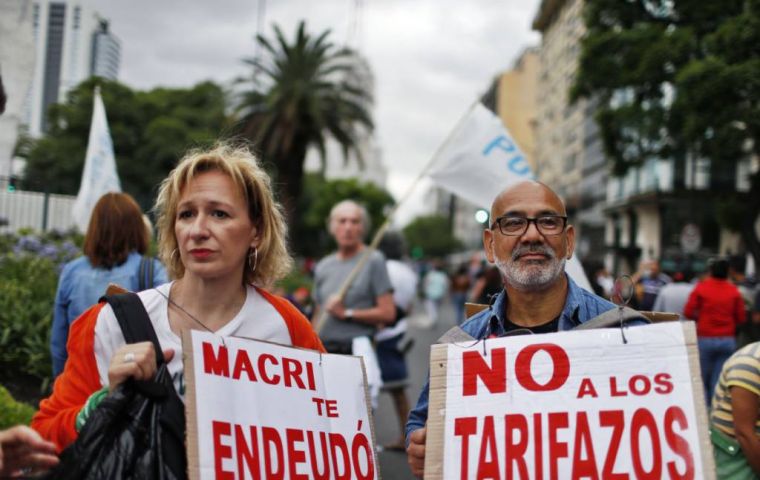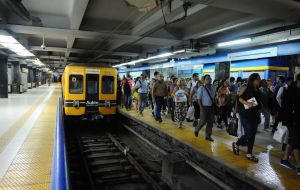MercoPress. South Atlantic News Agency
March of torches in Argentine cities to protest soaring costs of public services
 Weekly demonstrations are planned through early February in Argentina's main cities
Weekly demonstrations are planned through early February in Argentina's main cities  During the eight years of Macri's predecessor, ex president Cristina Fernandez rates were virtually frozen as well as transport tickets.
During the eight years of Macri's predecessor, ex president Cristina Fernandez rates were virtually frozen as well as transport tickets.  Macri slashed subsidies for public utilities to reduce the country's chronic fiscal deficit, pushing electricity and gas rates up to 2,000% since the start of his term
Macri slashed subsidies for public utilities to reduce the country's chronic fiscal deficit, pushing electricity and gas rates up to 2,000% since the start of his term Tens of thousands of Argentines marched through Buenos Aires on Thursday evening carrying torches, in the first of a series of planned protests against President Mauricio Macri's austerity program and the soaring cost of public services.
Macri slashed subsidies for public utilities and other services to reduce the country's chronic fiscal deficit, pushing electricity and gas rates up to 2,000% since the start of his term, according to estimates by local media.
Rates are expected to increase even more this year. During the eight years of Macri's predecessor, ex president Cristina Fernandez rates were virtually frozen as well as transport tickets.
“People can't make ends meet. All the measures taken by the government go against workers,” Pablo Moyano, leader of the powerful union of truck drivers, and one of the organizers of the protest.
Weekly demonstrations are planned through early February in Argentina's main cities, increasing pressure on Macri to solve the country's economic crisis ahead of a presidential election late this year.
Last year, when the economy contracted, inflation neared 50% and the peso lost close to 50% of its value, Macri reached an unpopular deal with the IMF for a US$57 billion lifeline in exchange for a commitment to cut the deficit.
The protesters in the capital Buenos Aires on Thursday, who witnesses estimated numbered at least 20,000, carried effigies of Macri and signs that read “Enough of the Macri/IMF austerity program” as they marched past the city's obelisk monument toward Congress.
Moyano's teamsters union and a federation of workers' unions, and warming up to ex president Cristina Fernandez planned comeback, organized the protests. Members of leftist political parties and independent Argentines have also joined in.
Macri slashed subsidies for public utilities and other services to reduce the country's chronic fiscal deficit, pushing electricity and gas rates up to 2,000% since the start of his term, according to estimates by local media.
Rates are expected to increase even more this year. During the eight years of Macri's predecessor, ex president Cristina Fernandez rates were virtually frozen as well as transport tickets.
“People can't make ends meet. All the measures taken by the government go against workers,” Pablo Moyano, leader of the powerful union of truck drivers, and one of the organizers of the protest.
Weekly demonstrations are planned through early February in Argentina's main cities, increasing pressure on Macri to solve the country's economic crisis ahead of a presidential election late this year.
Last year, when the economy contracted, inflation neared 50% and the peso lost close to 50% of its value, Macri reached an unpopular deal with the IMF for a US$57 billion lifeline in exchange for a commitment to cut the deficit.
The protesters in the capital Buenos Aires on Thursday, who witnesses estimated numbered at least 20,000, carried effigies of Macri and signs that read “Enough of the Macri/IMF austerity program” as they marched past the city's obelisk monument toward Congress.
Moyano's teamsters union and a federation of workers' unions, and warming up to ex president Cristina Fernandez planned comeback, organized the protests. Members of leftist political parties and independent Argentines have also joined in.




Top Comments
Disclaimer & comment rules-

-

-

Read all comments“And once more, the Argentines demonstrate that no one can fool all the Argentines all the time. Tic toc, Mauricio.”
Jan 11th, 2019 - 07:26 pm 0And yet Macri remains marginally more popular than CFK:
http://en.mercopress.com/2019/01/10/macri-and-cristina-fernandez-polarize-political-scenario-but-a-moderate-opposition-figure-is-emerging
EM,
Jan 15th, 2019 - 07:26 pm 0“Not having the nerve to comment on news about the economy, ineffable Zaphod chooses to fight on the hill of the opinion polls”
I agree that the economy is a mess, but an opinion poll is a better indicator of public opinion than a relatively small (“tens of thousands”) protest.
You agree that the polls put Macri and CFK close but then argue “The common citizen does not have such hesitations.”
“They've been demonstrating this week in Buenos Aires and provinces against steep energy services hikes announced late December. But Zaphod is saying nothing about it.”
I am saying nothing about the protests because they are a very poor indicator of the mood of your “common citizen”. If the opinion of the population follows a Normal distribution then those who protest are those who are sufficiently angry or otherwise motivated to get out into the streets and protest. Have you ever seen anyone protest because they were too happy? No, it never happens. So you are extrapolating from people who are in the tail of the bell curve and claiming they represent the common citizen. They don't and they never will (unless the demonstration is VERY large).
Facts beat opinion every time. In the absence of facts, statistics provide a tool to assess reality with an attempt to provide representative data. This is why I prefer (imperfect) opinion polls to statistically meaningless protests.
Do you have the nerve to accept that maybe you are out of touch with the opinion of the “common citizen” and the opinion polls may provide a better indication than a few thousand protesters?
When the economy goes bust in northern Europe or US/Canada, people go to work. When it happens in Argentina, people bang their drums.
Jan 16th, 2019 - 01:03 am 0Which culture do you think will prevail?
Commenting for this story is now closed.
If you have a Facebook account, become a fan and comment on our Facebook Page!